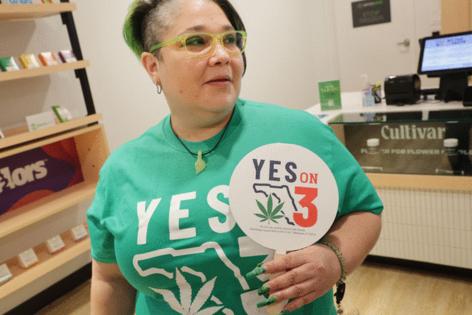Florida ballot initiative law can continue, federal judge says
Published in News & Features
TALLAHASSEE, Fla. — A federal judge on Wednesday largely denied a request from petition groups to block parts of a Florida law that changes how citizen-led amendments make it to the ballot.
In passing the law earlier this year, Gov. Ron DeSantis and the bill’s Republican sponsors said the petition process needed reform because it is riddled with fraud.
But groups like Florida Decides Healthcare, which is trying to get an amendment that will expand Medicaid access on 2026 ballots, quickly sued, saying the new law stifles people’s ability to use the petition process. Other groups, including the recreational marijuana campaign Smart & Safe Florida, joined the lawsuit.
U.S. District Judge Mark Walker largely denied the plaintiffs’ request to block three sections of the new law.
Plaintiffs had asked Walker to temporarily block a requirement that campaigns turn in all petitions within 10 days to county elections offices. They also contested changes that increased fines for organizations that turn in petitions late and that added new criminal penalties for filling in missing voter information.
The plaintiffs argued that the law violates the First Amendment right to engage in political speech.
But Walker, who was nominated to the bench by former President Barack Obama, said court precedent makes clear that the initiative process doesn’t have to be the most user-friendly version possible.
Walker said the challenging groups hadn’t yet proven they were “severely burdened” by the new law’s requirement to turn petitions in within 10 days and the increased late fines.
Instead, he said, “the record shows that these provisions simply make the process of getting their proposed initiatives on the ballot more expensive and less efficient for Plaintiffs.”
The marijuana and Medicaid expansion campaigns have said they’ve been affected by slowed petition collection and discouraged volunteers since the law took effect in early May.
The groups hoping to qualify for the 2026 ballot need about 900,000 verified petitions by early next year.
Out of all the groups’ asks, Walker granted only one plaintiff an injunction on one point.
Jordan Simmons, a project director for the Medicaid expansion group, challenged part of the law that includes election code violations for petition fraud in the racketeering statute.
Walker sided with Simmons’ argument that the racketeering law change was too vague.
Despite Walker rejecting most of the Medicaid expansion groups’ asks, Mitch Emerson, a spokesperson for Florida Decides Healthcare, called the ruling a “major victory.”
“While the Court did not grant every part of our motion for preliminary relief, this is far from the final word,” Emerson said in a statement. “This ruling was an early, extraordinary step in the legal process — and we are optimistic about what comes next, both for the remaining parts of HB 1205 that we’re challenging and for the future of citizen-led democracy in Florida."
Groups have for years used Florida’s ballot initiative process as a way to pass changes to the state constitution that lawmakers have refused to put forward. Through petition collection, groups have gotten voters to approve things like medical marijuana, felon voter restoration and a $15 minimum wage.
Last year, DeSantis used the power of his administration to successfully oppose two amendments put on the ballot through the petition process: the recreational pot amendment and one that would have protected abortion access.
Months after both those measures failed, DeSantis’ office suggested a draft bill that would have made petition collection virtually impossible.
During the injunction hearing in May, Glenn Burhans, an attorney for Smart & Safe Florida — which sponsored a failed 2024 ballot initiative to legalize recreational marijuana and is hoping to get a similar amendment on 2026 ballots — said that he thought lawmakers passed the petition change bill because the marijuana measure “is very popular.”
The challenge to the new law is ongoing, and the amendment groups are seeking to block other provisions of the law in another request for a temporary injunction.
_____
©2025 Tampa Bay Times. Visit tampabay.com. Distributed by Tribune Content Agency, LLC.







Comments